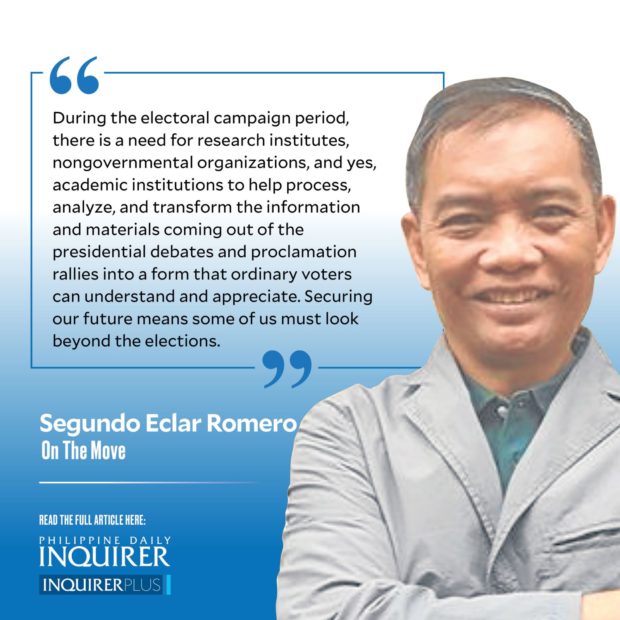
It is obvious that these results show that the content and style of campaigning as it is now practiced by the candidates using combinations of caravans, rallies, debates, interviews, colorful paraphernalia, and social media is not the determining factor. Working harder and covering more ground will not change the balance.
The survey results suggest there is a force akin to gravity that is at work. It is the weight of history, the gravitational pull of the Marcos brand on the consciousness of the people. That consciousness is sustained by a psychological foundation of artifacts in which generations have been marinated for decades since 1965.
The Marcos brand is a mental virus that has been awakened and cultivated by the “cyber air superiority” that Marcos has had since the 2016 elections when he started his long march to the presidency.
Filipinos are hurtling toward the May elections thinking that they have free will, when in fact they have been programmed to prefer Marcos Jr. over any candidate, regardless of platform, character, or competence. It is no less than a hypnotic trance, so constant and overwhelming that the people had no effective defense.
The administration, even if it had the capability, is no help, because it is a silent partner, benefitting from the same plague of disinformation that has visited the people.
The Marcos brand, blended with the Duterte brand via Sara Duterte, is now almost hardwired into the consciousness of the people.
The May 2022 elections will be no ordinary elections. The nation will go through the motions of electoral democracy. There is no corrective mechanism that the political system has put up for this phenomenon. The Commission on Elections (Comelec) itself has shown institutional weakness as the primary steward of the elections.
When the news broke in the media that the Comelec computers had been hacked, there has been no sufficient closure of this event to reassure the electorate that this has not and will not happen. The Ferolino decision gouged the public’s confidence in the Comelec. Frontloading an adverse decision against Marcos in the disqualification case would have won for the Comelec a boost in integrity without curtailing the chance for Marcos Jr. to prevail at higher levels.
Now, the Comelec has started to issue rally permits, measure the size of campaign materials, and regulate these even in private spaces, as if the outcome of the elections depended on these.
Pulse Asia and Social Weather Stations surveys are providing credible but alarming bulletins on the health of the political system. Despite an apparent groundswell for the VP Leni campaign, this does not register in the surveys. Now the results are taken to signal “ceilings” of voter support, e.g., that VP Leni has bumped into a 16-percent ceiling in voter approval. One wonders, is this ceiling a glass (gender) ceiling? Is it a cyber ceiling?
Or is it a psychological ceiling that repels any hint of confrontation, debate, or conflict? Marcos Jr. has delivered whole speeches that have embroidered on the concept of unity to the point of being atrociously redundant and tautological. Yet, it is as if he wields “unity” like a voter calming device, a hypnotic keyword that keeps people mesmerized.
It is time for dramatic shifts in campaign strategy. Intensifying the production and the wearing of campaign colors and waving at the people will not do the trick. Let’s face it. What the surveys are signaling is that the electoral campaigns are not taking the last mile of connectivity to reach the voters in their lairs.
Candidates and their supporters need to take time to have conversations with the people in their homes and neighborhoods (e.g., via two-hour charrettes), and not by parachuting in and delivering a one-sided spate of speeches and quickly moving on. Why do candidates think people will not be interested to talk about their problems and their efforts at self-help and mutual help, and what institutional help from the government they need to make ends meet? If the candidates and their supporters do not make time to listen to the real sentiments of the people, they lose their only chance to win.
—————-
doyromero@gmail.com